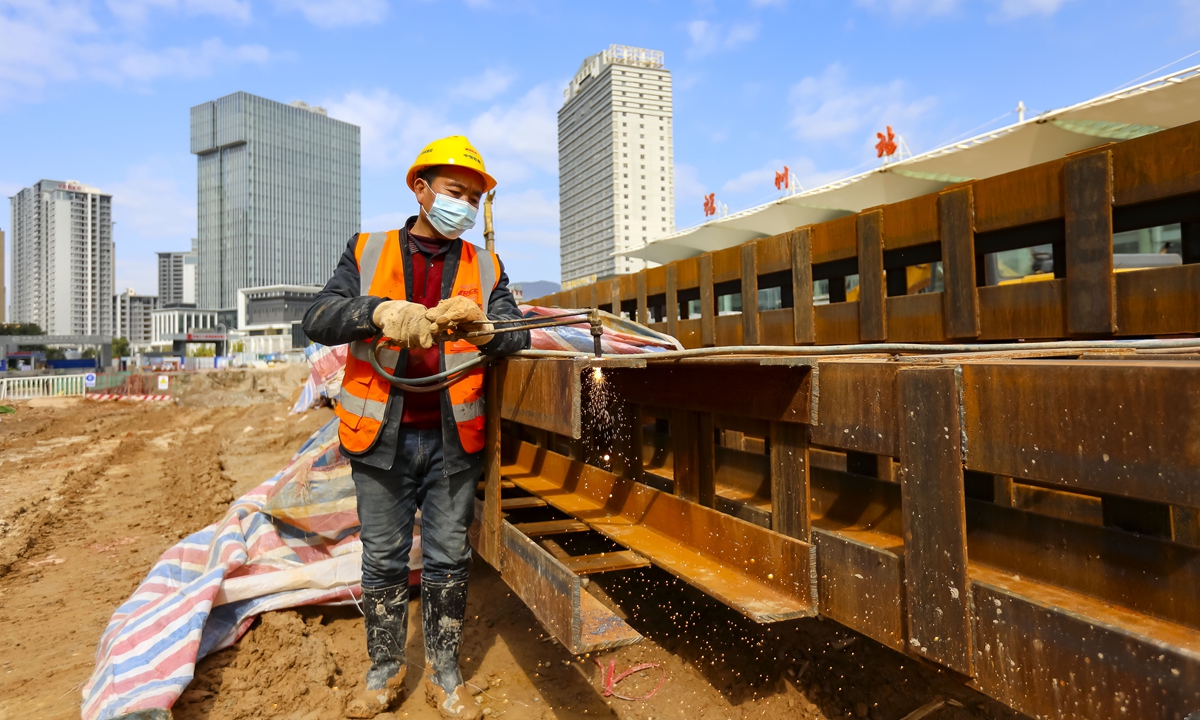
A worker cuts steel at a construction site in Fuzhou, East China's Fujian Province in February 2022. Photo: cnsphoto
The State Council, China's cabinet, has approved the restructuring plan of China's largest steelmaker, state-owned China Baowu Steel Group Corp and Sinosteel Group Corp, with Baowu assuming full control of Sinosteel, according to a statement on the website of the State-owned Assets Supervision and Administration Commission (SASAC) of the State Council on Wednesday.
The move is a new step in China's accelerated push for consolidation in the iron and steel industry, as part of efforts to promote the sector's high-quality development and optimize its pricing mechanism, observers said.
The deal will elevate the global competitiveness of Baowu Steel Group, which is already the world's largest steelmaker, across the industrial chain, in particular in overseas mineral resources.
The shares of Shanghai-listed Bao Steel, a unit of Baowu Steel, rose 0.53 percent to 5.69 yuan ($0.82) on Wednesday, before the deal was announced. Shenzhen-listed Sinosteel NMC, a subsidiary of Sinosteel, saw its shares sink by 1.73 percent to 10.20 yuan.
According to the announcement, Sinosteel will no longer be supervised by the SASAC after the restructuring. Both companies were centrally administrated state-owned enterprises before the merger.
It is expected that Sinosteel will operate as a subsidiary of Baowu, and their businesses integration will have a synergistic effect, complementing one other's advantages, analysts said.
In October 2020, Baowu Steel took stewardship of Sinosteel, which was struggling with debt woes.
"Sinosteel is not a traditional steelmaker but a company positioned in the steel industry chain. It has business in mineral resources, machinery equipment-building capacity and technological services. So the main goal of the restructuring is to enhance Baowu's global competitiveness across the industry chain, rather than output expansion," Wang Guoqing, research director at Beijing Lange Steel Information Research Center, told the Global Times on Wednesday.
According to a report Wang sent to the Global Times, Sinosteel holds shares in a number of overseas mines, including iron ore mines in Australia. "The deal will greatly boost the international resource management ability of Baowu," Wang said.
Last year, Baowu's crude steel output reached 120 million tons, leading the world. The company has set the goal of hitting 200 million tons of crude steel output by 2025, and holding 15 percent of the global market by 2035.
The merger is also a clear signal that the consolidation of China's steel industry is speeding up, as steel enterprises have a window of opportunity for mergers and restructuring amid policy guidance.
"Consolidation is conducive for the industry's high-quality development. It raises the market concentration and optimizes the domestic competition landscape, which will help stabilize market prices," Wang explained.
It is expected that China's steel industry concentration ratio would rise to 41.4 percent in 2022, according to a report issued by the China Metallurgical Industry Planning and Research Institute on Tuesday.
The report rated 19 Chinese steel companies, including Baowu and Angang Steel Group, as A+ level, or close to world-leading level.
In April, the National Development and Reform Commission (NDRC), the country's economic planner, said China should ensure a year-on-year drop in crude steel output in 2022, amid a continuous effort to push the industry's high-quality development.
In 2021, China completed the task of reducing crude steel output by 30 million tons, according to the NDRC.




